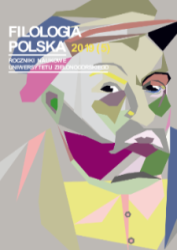Past – present – future, kai eleutheria – kai aletheia – kai agathon, Plato – Nicolai Chiaromonte – Wojciech Karpiński (ontological-axiological triangles)
Keywords
Abstract
In the article, some ontological and axiological aspects in the artistic works of Nicola Chiaromonte and Wojciech Karpiński in the context of mathematical deliberations of Plato are being analysed. For the Greek philosopher, mathematics aided in interpreting reality, values, and questions concerning existence. The meeting with culture and Greek philosophy induced the Italian thinker and the Polish writer to contemplate arche with such values as freedom, truth, goodness and beauty.
References
LITERATURA CYTOWANA
Albert K., O Platońskim pojęciu filozofii, przeł. J. Drewnowski, Warszawa 1991.
[Google Scholar]
Assmann A., Cultural Memory and Western Civilization. Functions, Media, Archives, Cambridge 2011.
[Google Scholar]
Berger G., Phénoménologie du temps et prospective, Paris 1964.
[Google Scholar]
Chiaromonte N., Co pozostaje. Notesy 19551971, wyb., przekł., posłowie S. Kasprzysiak, wstęp W. Karpiński, Warszawa 2001.
[Google Scholar]
Chiaromonte N., Notatki, wyb. i posłowie W. Karpiński, przeł. S. Kasprzysiak, Gdańsk 2015.
[Google Scholar]
Dembiński B., Późna nauka Platona. Związki ontologii i matematyki, Katowice 2003.
[Google Scholar]
Goff Le J., Historia i pamięć, przeł. A. Gronowska, J. Stryjczyk, Warszawa 2007.
[Google Scholar]
Goody J., Mémoire et apprentissage dans les sociétés avec et sans écriture: la transmission du Bagre, „L’Homme” 1977, t. 17.
[Google Scholar]
Halbwachs M., Społeczne ramy pamięci, przeł. i wstęp M. Król, Warszawa 2008.
[Google Scholar]
Hegel G.W., Wykłady o estetyce, przeł. J. Grabowski, A. Landman, Warszawa 1964-1967.
[Google Scholar]
Janet P., L’evolution de la mémoire et de la notion du temps. Compterendu intégral des conférences d’aprés les notes sténographiques, Paris 1928.
[Google Scholar]
Jordan Z., O matematycznych podstawach systemu Platona, Poznań 1937.
[Google Scholar]
Karpiński W., Szkice sekretne, Warszawa 2017.
[Google Scholar]
Karpiński W., Twarze, Warszawa 2012.
[Google Scholar]
Maryniarczyk A., W poszukiwaniu źródeł prawdy, „Człowiek w Kulturze” 2000, nr 13.
[Google Scholar]
Platon, Fajdros,przeł. W. Witwicki, Warszawa 1958.
[Google Scholar]
Platon, Fedon, przeł. W. Witwicki, Kęty 2002.
[Google Scholar]
Platon, Fileb, przeł. W. Witwicki, Kęty 2002.
[Google Scholar]
Platon, Menon, przeł. W. Witwicki, Warszawa 1935.
[Google Scholar]
Platon, Państwo, przeł. W. Witwicki, Kęty 1997.
[Google Scholar]
Platon, Timajos, przeł. P. Siwek, Warszawa 1986.
[Google Scholar]
Ricoeur P., Pamięć, historia, zapomnienie, przeł. J. Margański, Kraków 2006.
[Google Scholar]
Tomasz z Akwinu, De Veritate. O prawdzie, przeł. A. Białek, Lublin 1999.
[Google Scholar]
Wal J., Kultura dialogu, Kraków 2012.
[Google Scholar]
Żak D., Teoria malarstwa abstrakcyjnego a Platońska koncepcja sztuki, „Podstawy Edukacji. Zrównoważony Rozwój” 2016, nr 9.
[Google Scholar]
Preview
Downloads
Published
How to Cite
Issue
Section
Categories
Copyright & License

This work is licensed under a Creative Commons Attribution-NonCommercial-NoDerivatives 4.0 International License.
Copyrights (a). In principle, authors who are not employed by the University of Zielona Góra retain the copyright, including publishing rights to the articles, without restrictions.
Copyrights (b). In principle, authors who are employed by the University of Zielona Góra, do not retain the copyright, including publishing rights to the articles. In such cases the copyright holder is the University of Zielona Góra.







































